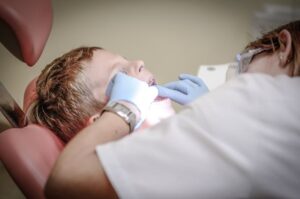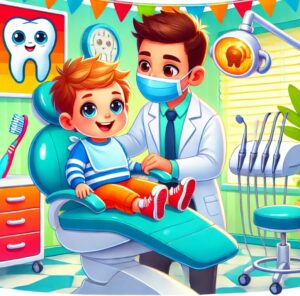Cavities, also known as dental caries, are a common issue for children, but they are preventable with the right habits. Early prevention not only helps keep teeth healthy but also promotes long-term dental health. Below are some essential tips for parents to help their children avoid cavities.
1. Brush Twice a Day with Fluoride Toothpaste
One of the most fundamental habits for preventing cavities is brushing teeth twice a day. Fluoride toothpaste helps strengthen the enamel, making teeth more resistant to acid attacks from food and bacteria. Fluoride also helps to reverse early signs of tooth decay.
Tip for Parents: Make sure children use a soft-bristled toothbrush and fluoride toothpaste. Supervise brushing until they can do it independently, typically around age 6 or 7.
2. Floss Daily
Flossing helps remove plaque and food particles between teeth where a toothbrush can't reach. This step is crucial because cavities often form between teeth if food is left trapped.
Tip for Parents: Encourage your child to floss daily, and for younger children, you can help them with floss picks or pre-threaded flossers.
3. Limit Sugary Snacks and Drinks
Frequent consumption of sugary snacks and drinks, such as candy, cookies, sodas, and juices, can increase the risk of cavities. The sugar feeds bacteria in the mouth, which produce acids that attack tooth enamel.
Tip for Parents: Offer healthier snack alternatives like fruits, vegetables, cheese, or yogurt. Limit the consumption of sugary drinks and encourage drinking water instead, especially between meals.
4. Encourage Drinking Water
Water is the best drink for dental health because it helps wash away food particles and bacteria from the mouth. Fluoridated water also provides added protection against tooth decay by strengthening enamel.
Tip for Parents: Make water the go-to drink for your child throughout the day, especially after eating sugary or acidic foods. Encourage them to swish water in their mouth after meals to help remove food debris.
5. Use Dental Sealants
Dental sealants are a thin protective coating applied to the chewing surfaces of back teeth (molars). They prevent food and bacteria from getting trapped in the grooves, significantly reducing the risk of cavities.
Tip for Parents: Ask your dentist about dental sealants when your child’s molars start coming in (around age 6). Sealants can last for several years and provide extra protection against decay.
6. Regular Dental Checkups
Scheduling regular dental visits is essential for keeping teeth healthy. Dentists can detect early signs of decay and apply treatments such as fluoride varnishes to protect teeth. Professional cleanings also help remove plaque buildup that may lead to cavities.
Tip for Parents: Schedule dental checkups every six months, and follow through with any recommended treatments, such as fluoride applications or cleanings.
7. Limit Acidic Foods and Drinks
Acidic foods and drinks, like citrus fruits, sodas, and sports drinks, can erode enamel over time, making teeth more susceptible to cavities. Although some of these foods can be part of a healthy diet, it's essential to moderate consumption.
Tip for Parents: Encourage your child to drink water after consuming acidic foods to help wash away acids and protect their teeth.
8. Avoid Baby Bottle Tooth Decay
For babies and toddlers, prolonged exposure to sugary liquids in baby bottles, especially at bedtime, can cause a condition known as baby bottle tooth decay. Milk, formula, and juice can pool around the teeth during sleep, leading to cavities.
Tip for Parents: Avoid letting your child fall asleep with a bottle of anything other than water, and begin brushing their teeth as soon as they have their first tooth.
9. Instill Good Oral Hygiene Habits Early
Developing good oral hygiene habits early in life can prevent many dental issues down the road. Teaching children proper brushing and flossing techniques, as well as the importance of visiting the dentist regularly, will help them maintain good dental health.
Tip for Parents: Make brushing and flossing fun by using colorful toothbrushes, toothpaste with favorite characters, or setting a timer to encourage them to brush for the recommended two minutes.
10. Educate on the Importance of Oral Hygiene
It's important to explain to your child why taking care of their teeth matters. When they understand that brushing, flossing, and healthy eating prevent cavities and avoid painful treatments, they are more likely to stick to their routine.
Tip for Parents: Share stories or use educational videos about dental health to help your child grasp the concept of cavity prevention.
Reference:
American Dental Association (ADA) - They provide guidelines and tips for parents on oral hygiene and cavity prevention for children.
ADA: Children's Oral Health
Centers for Disease Control and Prevention (CDC) - The CDC offers information on dental health, including tips for preventing cavities in children.
CDC: Oral Health
Mayo Clinic - This resource includes articles on dental health and specific strategies to prevent cavities in children.
Mayo Clinic: Children's Dental Health
American Academy of Pediatric Dentistry (AAPD) - They provide comprehensive guidelines and resources for parents regarding children's dental health.
AAPD: Guidelines on Pediatric Dental Health
National Institute of Dental and Craniofacial Research (NIDCR) - This institute offers insights into tooth decay and prevention methods for children.
NIDCR: Tooth Decay













